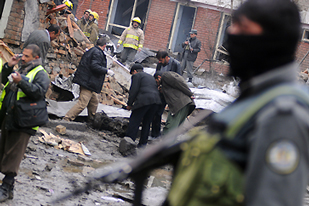 – Bad-Suicide-Bombings: 18 Dead, 32 Wounded; Indians Targeted – “I saw foreigners crying and shouting … It was a very bad situation inside,” said Najibullah, hotel worker. (Al Jazeera)
– Bad-Suicide-Bombings: 18 Dead, 32 Wounded; Indians Targeted – “I saw foreigners crying and shouting … It was a very bad situation inside,” said Najibullah, hotel worker. (Al Jazeera)
Juan Cole has the story. Writes Cole: “[T]he Taliban are apparently attempting to destabilize the capital and to punish foreigners working to stand up the new government (in this case India), using the tactics of Sunni radical insurgents in Baghdad. While this tactic can indeed slow state formation, it is just the act of a spoiler and does not lead to any positive political achievements.”
The Afghan capital was struck by three suicide bombings early Friday morning, beginning at 6:30 am local time. Radio Azadi reports that there were five attackers, who struck in the area near the entrance of the Hotel Safi Landmark. The first bomb damaged the hotel.
Two of these bombings, Aljazeera Arabic says, targeted guest houses for Indian expatriates in Kabul who work for companies or NGOs. The third blast was huge, and the guesthouse was left in rubble, such that there may be bodies still within. As I write, the death toll is estimated at 18, with 32 wounded, and some of the dead are Indians and many of the wounded are. The Aljazeera correspondent says that Taliban spokesman Zabihullah Mujahid told him that the mission had been to hit the “enemies of Afghanistan from among the foreign Indians.” The Sydney Morning Herald confirms that the Taliban were targeting Indian hostels.
The Taliban have hit the Indian embassy in Kabul twice, once in July 2008, and again in October 2009. Many Taliban have helped train or fought alongside Pakistani militant vigilantes fixated on overthrowing Indian rule of Muslim-majority Kashmir.
India is also a significant provider to Afghanistan of development aid and investment, and so is helping build up the government of Hamid Karzai. Having offered $1.2 billion in reconstruction aid, India is the largest regional donor. There are some 4,000 Indian workers in the country, some of them “security personnel,” according to the US Council on Foreign Relations.
Several prominent Tajik (Persian-speaking Sunni) politicians have long-standing ties to New Delhi because India’s Research and Analysis Wing (RAW, the equivalent of the CIA) provided aid to the old Northern Alliance at a time when it was under siege in the late 1990s by the Taliban. These Tajiks are die-hard enemies of the Taliban, who had committed massacres against them. The Taliban animus against India thus is multifaceted.
The attack lasted about 4 hours, according to Radio Azadi, with some of the attackers using small arms fire. All five were ultimately killed.
Some observers were surprised that the attack was launched on the commemoration of the birth of the Prophet Muhammad. But many hard line Salafi revivalists, who say they want to go back to the practice of Islam that prevailed among the first generation of the companions of the Prophet, oppose celebration of birthdays in general and of that of the Prophet in particular.
Pollster Matt Dabrowski tweeted from Kabul that he was awakened by the first blast, and could see a smoke column bigger than the downtown indoors market building.
US Navy Lt. Joe Halstead tweeted from Kabul, “Insurgents using Mohammed’s Birthday and attempting to counter progress in Marjah with attack in Kabul today.”
Friday’s attack resembled one in January. Although the Taliban are attempting to project an image of Kabul as having little security and the Karzai government as helpless in the face of their assaults, actually they are just proving that the Afghanistan security forces are pretty good and can fairly easily capture or kill attackers.
The Taliban have lost momentum on two fronts in recent weeks. The CSM estimates that Pakistani authorities have captured 7 of the 15 membersof the Quetta Shura, the command council of the Old Taliban of Mullah Omar. American drone strikes killed another major Taliban leader in North Waziristan on Thursday, Muhammad Qari Zafar. He was a mastermind of the attack on the US consulate in the southern Pakistan port of Karachi in 2006.
The other front is Marjah, where Taliban direct attacks are becoming rare as the US military and the Afghanistan National Army establish control of the city of 80,000. Some twenty thousand residents have fled to nearby Lashkar Gah, the capital of Helmand province. The Taliban are still fighting with roadside bombs, and are likely to go doing so for some time.
In the wake of these two defeats, the Taliban are apparently attempting to destabilize the capital and to punish foreigners working to stand up the new government (in this case India), using the tactics of Sunni radical insurgents in Baghdad. While this tactic can indeed slow state formation, it is just the act of a spoiler and does not lead to any positive political achievements.
ATTENTION READERS
We See The World From All Sides and Want YOU To Be Fully InformedIn fact, intentional disinformation is a disgraceful scourge in media today. So to assuage any possible errant incorrect information posted herein, we strongly encourage you to seek corroboration from other non-VT sources before forming an educated opinion.
About VT - Policies & Disclosures - Comment Policy




